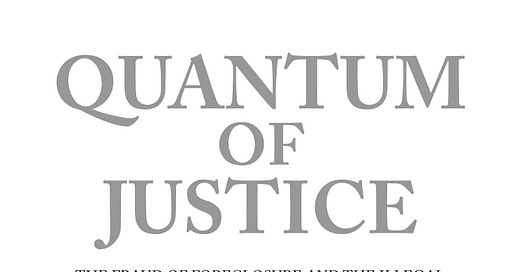QUANTUM OF JUSTICE official release
The fraud of foreclosure and the illegal securitization of notes by Wall Street - the David and Goliath story of one man against the system.
I am excited to announce the release of my new book “Quantum of Justice”, available everywhere, in May of 2021, by Olive Publishing, LLC.
This project was ten years in the making including the legal battle itself against Wells Fargo Bank for Fraud. What I learned while acting as my own attorney litigating against one of the world’s largest corporations literally changed the trajectory of my life.
I have included an exerpt here to help explain what you will find inside this David and Goliath story of one man against the system.
“In early 2014, when arguing our fourth amended complaint in court, I finally asked the judge, “Your honor, with all the evidence that we’ve presented here in your court over the past three and a half years of this litigation, and the 114 different motions and responses in this case that have been submitted, I ask Wells Fargo Bank to answer this one detailed question. If they can simply answer it and tell me that I’m wrong, I’ll stop the litigation and leave. And the question is this, your honor:
Isn’t it true that a financial institution knows that a trustee in a Deed of Trust contract has absolutely no power to police a beneficiary’s actions in a power of sale clause in such a contract due to SB1638(1996), which beginning on Jan. 1, 1998 changed the wording to California Civil Code section 2923.5(g) therein giving the power to the beneficiary to substitute the trustee at their will, thereby eliminating any independence that the trustee is supposed to possess, as originally intended by the State Supreme Court in 1978 through the Garfinkle v Contra Costa County case?
As a lender knows this and can subsequently choose the trustee who will do the bank’s bidding for them, they can therefore submit fraudulent documents at any time to the county office and illegally begin the foreclosure procedure against any borrower and steal their home whether they are current on their mortgage or not. Isn’t this prima facie evidence that there is no independence of the trustee in a Deed of Trust? And if the trustee doesn’t hold any power to police the actions of the beneficiary in a Deed of Trust agreement, doesn’t that make the deed of trust agreement void on its face?
And if the banks know this and fail to inform the borrower of this fact, doesn’t it then mean that this is actionable fraud based on the withholding of vital information that would be pivotal to the borrower’s final decision making process before entering into the contractual agreement? And through the deceptive acts of the lender in the real estate transaction by withholding information from the borrower, simply mean that there is not a true meeting of the minds due to the contract’s concealment of information by the bank from the borrower?
And if there were no true meeting of the minds, which is a cornerstone of contract law and the definition of a legal, binding agreement based on the statute of frauds (1677), without which the contract is then indeed void? And if the Deed of Trust agreement is actually void, does it not mean that the beneficiary can be held liable for all the funds they received from the borrower throughout the duration of the contract agreement, including penalties?
And wouldn’t it also mean that they deceived the court by stating that they have any standing or jurisdiction to argue a contract that is void on its face due to the fraud they perpetrated against the borrower now here in the court?
And wouldn’t they also be liable to the borrower for all profits made by their manipulation of the borrower’s contract through the securitization of that note on Wall Street. And would the beneficiary also be liable to the borrower for committing mail fraud for every document sent to the borrower during the duration of the contract, thereby acting on behalf of a fraudulent contract agreement to entice and coerce to incite any payments or penalties accrued from the borrower based on the fraudulent Deed of Trust contract agreement?
And wouldn’t that also mean the security with which that contract was pooled into each tranche of an investment vehicle, such as a mortgage-backed security, then indeed, be based on fraud, making that investment vehicle void?
And wouldn’t the beneficiary also be liable to the court for knowingly deceiving and committing fraud against the court for every Deed of Trust and foreclosure document filed into the court system?”
The judge sat motionless. “Can they show me that I am wrong?” I added as the string of lawyers from Wells Fargo Bank sat silently with no response.
They couldn’t show the court that I was wrong then, and still can’t.
But let’s not get ahead of ourselves. Let’s get back to the beginning.”





